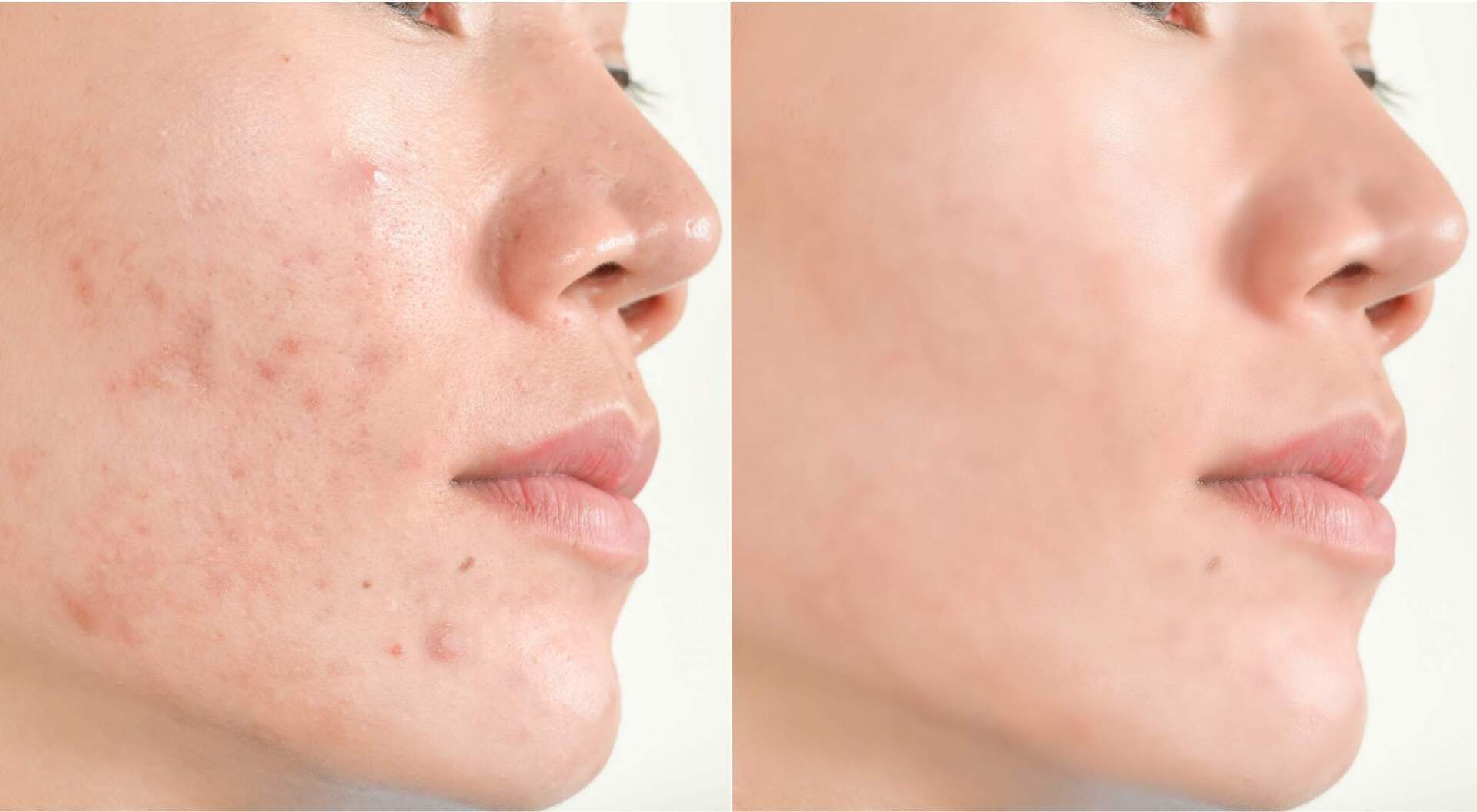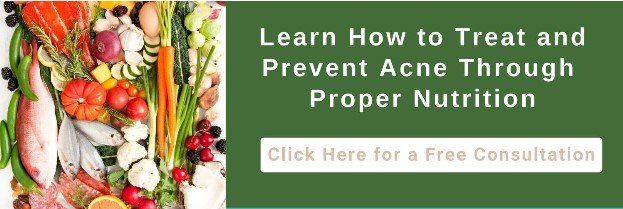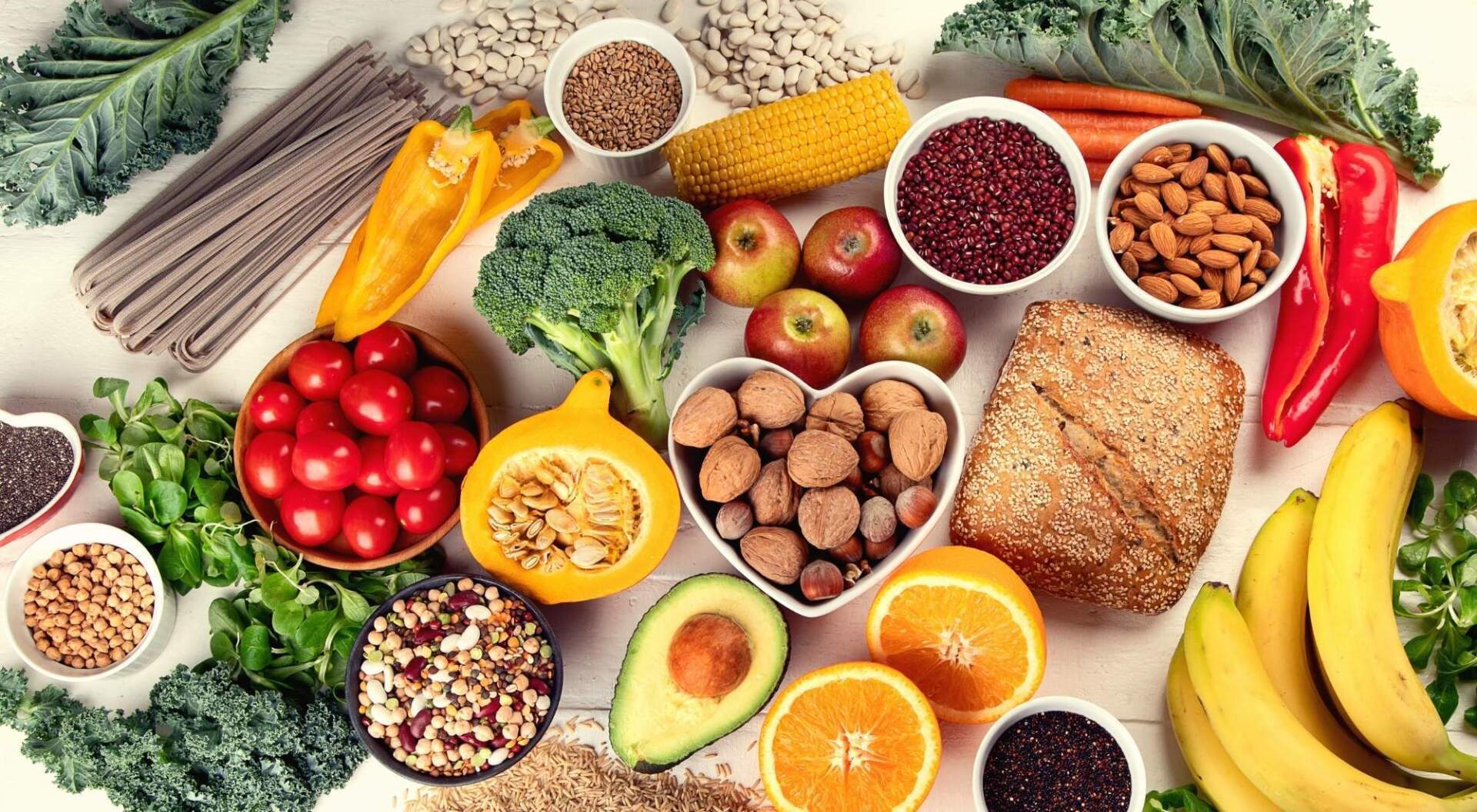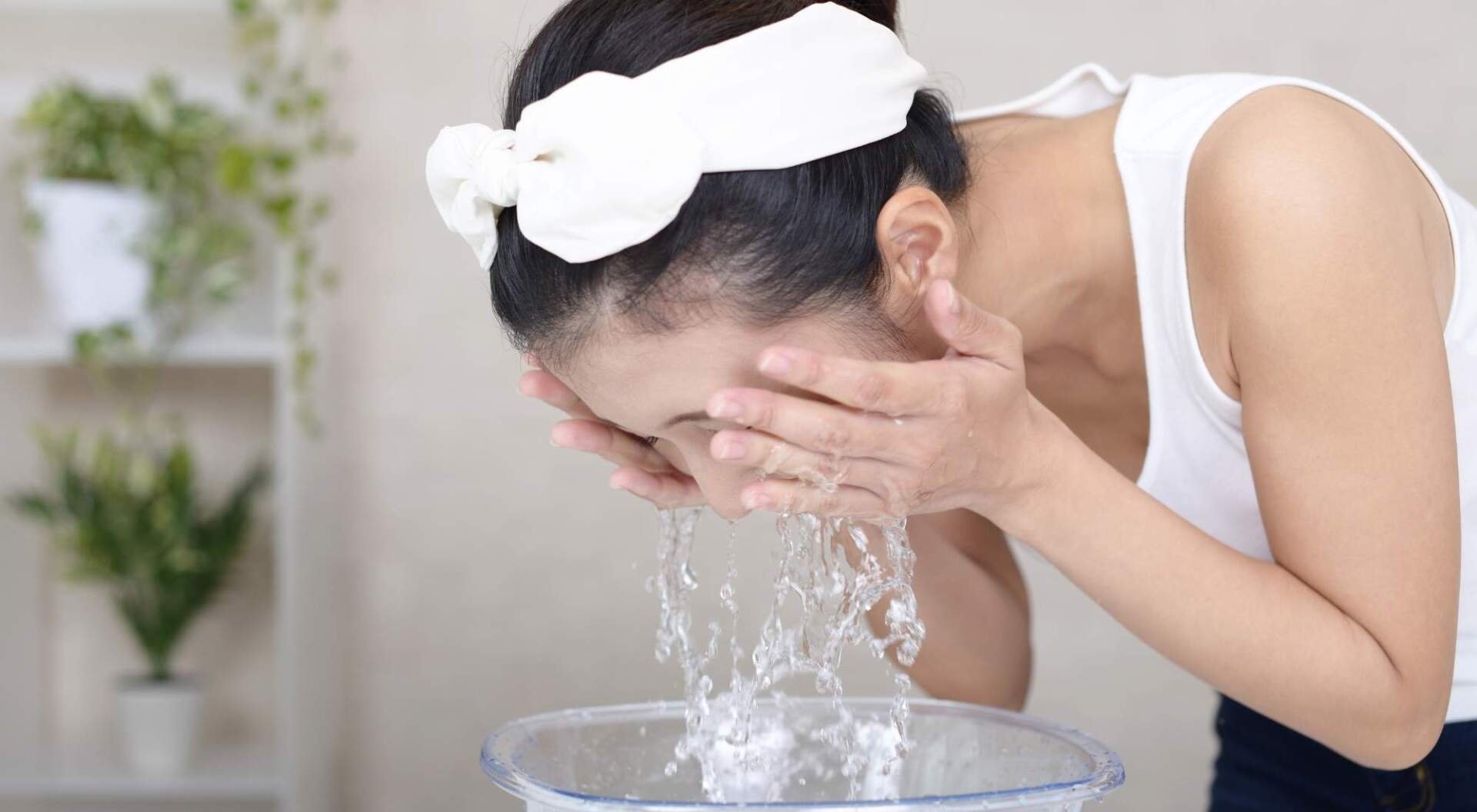Foods to Eat to Help Acne: Top Foods, Vitamins, and Minerals to Help Treat and Prevent Acne and What You Should Avoid
"The content below is not intended to be a substitute for professional medical advice, diagnosis, or treatment. Always seek the advice of your physician or other qualified health provider with any questions you may have regarding a medical condition."
Whether you're a teenager or an adult dealing with acne, you know how disheartening and frustrating it can be.
Perhaps you’ve tried medications and creams to no avail, and you’re wondering if what you eat has anything to do with your acne symptoms. You feel certain that you notice breakouts after sugar-filled splurges, but maybe that’s just your imagination.
Can your diet really have that much of an effect on your skin? Yes, it can!
We’re here to help you understand about:
- The best foods to eat for acne-free skin
- The foods to eat to help acne; and
- The foods to avoid to lessen acne symptoms
Table of Contents
Does a Poor Diet Cause Acne?
Though more research needs to be done to provide a definitive answer to this question, there is reason to believe a diet high in sugar, dairy, and processed carbs can contribute to acne.
Acne is caused when pores get clogged with oil (sebum), dead skin cells, and bacteria.
Foods that you eat — like the ones mentioned above — can increase the release of insulin-like growth factor-1 (IGF-1), a growth hormone. When you have extra IGF-1 in your blood, it can stimulate your oil glands to produce more sebum, increasing your chances of inflammation and acne.
Researchers in one study tested the effects of foods like …
- Milk
- Dairy products
- Chocolate; and
- High glycemic foods
… and found that especially
high glycemic foods may be common culprits that increase acne symptoms.
Will Changing Your Diet Help With Acne?
Because the verdict is still out on how your diet affects acne, it’s a good idea to keep a food log to see if there is a connection between certain foods and acne breakouts.
Nutrition Response Testing is also an excellent option to see how the foods you eat are affecting your health.
At HealthierU, Dr. Donna Sergi uses this non-invasive, multistep method to test different foods, chemicals, and other substances to see how your neurologic reflex is affected. Weakened neurologic reflexes are a sign a food or substance may be unhealthy for your body.
Click
here to learn more about Nutrition Response Testing and how it can give you the nutrition answers you’re looking for to treat problematic acne.
6 Foods to Eat for Acne
To help control acne symptoms and breakouts, aim to stick to the following types of foods:
- Unprocessed foods
- Whole foods
- Low-glycemic foods; and
- Foods rich in omega-3 fatty acids
Let’s look at a list of specific foods that fit into these categories.
#1: Whole Grains
Whole grains are those that have not been refined to remove the germ and bran from the grain.
Whole grains to include in your diet if you struggle with acne include:
- Whole wheat bread
- Wild rice
- Brown rice
- Quinoa
- Farro
- Oats
- Buckwheat
#2: Legumes
Some of the following legumes may be rich in omega-3 fatty acids:
- Chickpeas
- Black beans
- Lentils
- Kidney beans
- Peas
- Soybeans
- Navy beans
#3: Unprocessed Fruits and Veggies
Whole fruits and vegetables are an excellent choice to include in your diet, and since there are so many choices, you’re sure to find something that pleases your palate in addition to helping your skin.
Some fruits to consider include:
- Berries
- Blueberries
- Raspberries
- Strawberries
- Blackberries
- Grapefruit
- Oranges
- Apples
- Cherries
- Bananas
- Pears
- Grapes
- Peaches
- Apricots
The following are whole vegetables and starchy vegetables to include in your diet:
- Broccoli
- Spinach
- Kale
- Peppers
- Zucchini
- Cauliflower
- Carrots
- Beets
- Sweet potatoes
- Butternut squash
#4: Fish
Fish is one of the leading foods packed with omega-3 fatty acids and is also filled with all kinds of beneficial vitamins and minerals.
Good choices for an acne prevention diet include:
- Salmon
- Shellfish
- Mackerel
- Salmon; and
- Sardines
Other high-quality protein options to choose from are:
- Grass-fed beef
- Turkey
- Chicken
- Tofu
- Eggs
#5: Nuts and Seeds
Nuts and seeds are other excellent choices to help you add healthy fats to your diet. They are rich in antioxidants like vitamin E and selenium.
And there are so many to choose from, like:
- Walnuts
- Almonds
- Peanuts
- Brazil nuts
- Cashews
- Flaxseeds
- Mustard seeds
- Pumpkin seeds
#6: Green Tea
Speaking of antioxidants — green tea is known for its high antioxidant levels as well as its anti-inflammatory effects.
In a four-week study, 80 women with moderate to severe acne saw significant improvement in their symptoms when they were given 1,500 mg of green tea extract.
Green tea can be found at just about any grocery store, and drinking three to five cups a day can deliver optimum health benefits.
5 Vitamins and Minerals for Acne Prevention and Treatment
Many of the foods we’ve mentioned above contain the vitamins and minerals we’ll discuss below.
It’s important to know you can also add these vitamins and minerals to your diet via supplementation.
Before taking supplements, it’s always a good idea to speak with your health practitioner to help you find the best supplements for your body’s needs.
When you visit
HealthierU, Dr. Sergi uses resources like Nutrition Response Testing to determine your dietary needs. Once those needs are determined, she will work with you to create the best treatment plan —
including appropriate supplements — to promote healthy skin.
#1: Zinc
Zinc is an important trace element found in …
- Fish
- Poultry
- Red meat
- Quinoa; and
- Pumpkin seeds
… and helps support immune function and wound healing.
In addition to helping with skin health, zinc has also been found to aid in metabolism and hormone levels.
Since the body doesn’t store zinc, you must get it from your diet. If you have trouble getting the zinc you need from the food you eat, getting zinc as a supplement might be a good idea.
#2: Vitamin A, D, and E
Vitamins A, D, and E can be helpful to acne sufferers for the following reasons:
- Vitamin A is important for immune function and growth and development. It also helps reduce inflammation, decrease oil production, and stimulate skin cell turnover.
- Vitamin D is mostly known for its ability to promote strong bones by helping the body absorb calcium. Additionally, vitamin D has anti-inflammatory properties that may help reduce acne inflammation.
- Vitamin E contains antioxidant properties that can help with skin. Vitamin E is also an anti-inflammatory and helps promote cell regeneration.
Leafy green vegetables and orange and yellow vegetables are prime food choices to add vitamin A to your diet.
If you want to include more vitamin D, try adding fish, like tuna and salmon.
To get more vitamin E in your diet, eat nuts and seeds like almonds, pine nuts, and sunflower seeds.
Some vitamins can be toxic if taken in abundance and can cause damage to some organs.
Always talk to your healthcare provider before adding supplements of these vitamins to your daily regimen.
#3: Antioxidants
Antioxidants are important substances that keep cells from being damaged by free radicals, which are known for contributing to health issues like cancer.
Though more research is needed, many believe that antioxidants contribute to skin health and the decrease in acne symptoms because of their ability to help with skin cell turnover and collagen production.
Many of the foods we mentioned above are high in antioxidants along with the following:
- Artichokes
- Cabbage
- Asparagus
- Radish
- Lettuce
- Squash; and
- Collard greens
#4: Omega 3 Essential Fatty Acids
Omega-3s are a type of fat that is well-known for promoting cardiac health. But when combined with antioxidants, omega-3s can also help decrease inflammation.
Omega-3s can also aid in smooth, soft skin by:
- Promoting healthy cell membranes
- Hydrating the skin
- Controlling oil production
- Reducing acne symptoms
In addition to the foods listed above, the following options are good choices to include more omega-3 fatty acids in your diet:
- Olive oil
- Avocados
- Nut butters
- Coconut oil; and
- Chia seeds
#5: Probiotics
Probiotics are live yeast and bacteria that are known to be good for your health, especially your gut health. A healthy gut is linked to decreased inflammation, which is also linked to a lower chance of acne symptoms.
In a 2015 study, researchers found that probiotics help with acne by decreasing P. acne (Propionibacterium acnes) counts on the skin and “inducing the production of healthy ceramides… and helps restore healthy fats.”
Probiotics can be found in:
- Kefir
- Yogurt
- Kimchi
- Kombucha
- Miso
- Tempeh
- Sauerkraut
Treating and Preventing Acne: Foods to Avoid
We’ve talked a lot about foods to eat — and fortunately, there are lots to choose from.
But to get a better idea of what an acne diet should look like, we need to take a look at the types of food to avoid.
To keep it simple, avoid foods that are:
- Highly refined or processed
- Laden with sugar; and
- High-glycemic
Foods to avoid that fit into one or all of these categories include:
- White breads
- Instant cereals
- Sweetened breakfast cereals
- Some vegetables like potatoes and pumpkin
- Enriched pastas
- White rice
- Snack foods like pretzels, potato chips, and popcorn
- Sugary drinks and sweetened juices
- Cakes, cookies, pies, and candy
Making healthy choices isn’t always easy with our busy lives. It’s all too easy to run through the fast food drive-thru for lunch or grab unhealthy snacks as you run out the door.
A consistent, healthy diet takes motivation, initiative, and planning.
At HealthierU, we can help you create a health plan and diet that will work for
your
body and
your
busy schedule.
HealthierU: Using Nutrition Response Testing to Determine Your Best Foods to Eat for Acne
Whether you’re dealing with …
- Acne
- Hormonal imbalance
- Weight loss
- Digestive health
- And more
… HealthierU can help.
We combine Nutrition Response Testing and holistic chiropractic to help pinpoint the cause of symptoms and address them with natural treatments and nutrition.
If you suffer from acne, your unique nutrition plan will include the best foods to eat for acne prevention and foods to improve acne symptoms.
If you’re in the Brooklyn, NY, area and are ready for acne relief, don’t wait any longer. Contact Dr. Sergi today.






